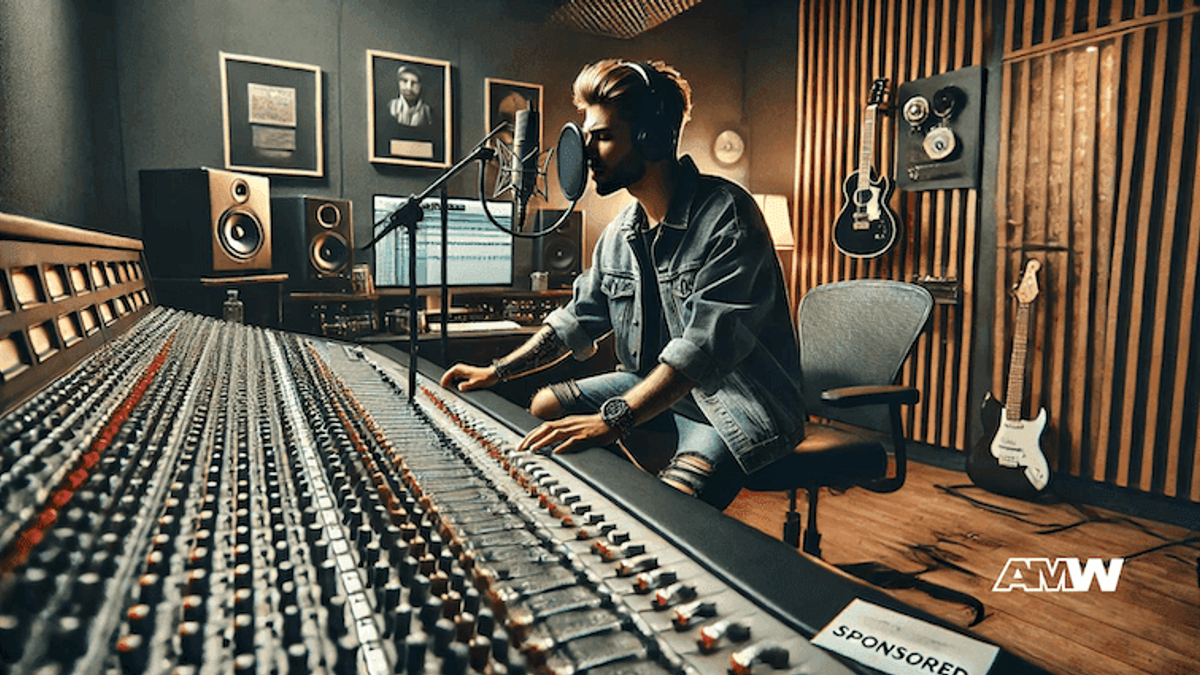The Ultimate Guide on How to Get Sponsors for Your Music

In the music industry, securing sponsors can make a big difference in your music career. Sponsorships provide financial support, resources, and increased exposure, all of which are crucial for musicians looking to advance their careers. Understanding the dynamics of sponsor music and how to effectively attract music sponsors is essential for long-term success.
Quick Summary
In the music industry, securing sponsorships is vital for artists to elevate their careers. These partnerships provide essential financial support, resources, and increased visibility. Musicians should strategically identify potential sponsors whose values align with their brand and effectively prepare personalized proposals. Engaging in networking, particularly at industry events, can lead to valuable connections. Successful sponsorships require careful negotiation, formal agreements, and ongoing communication, ensuring that relationships foster mutual benefits for both artists and sponsors.
This guide can help you navigate music sponsorships, providing actionable strategies to secure the backing you need.
Securing sponsorships is a game-changer in the music business. For many musicians, the dream of transforming their passion into a sustainable career hinges on the ability to attract the right sponsors. These sponsors not only provide the necessary funds to produce high-quality music but also offer valuable resources and media coverage that can catapult a musician's visibility. In essence, the support from sponsors can be the defining factor between a struggling artist and a successful one.
The music industry is replete with opportunities for sponsorship, but understanding how to tap into these opportunities requires a strategic approach. Sponsorships in the music industry come in various forms, each offering unique benefits that can significantly impact a musician's career. Corporate sponsorships, for instance, involve companies partnering with musicians to promote their brand identity. These partnerships often come with financial support and extensive marketing efforts that enhance the musician's visibility and reach. For example, a well-known brand might sponsor a musician's tour, providing the necessary funds for travel and promotion while associating their brand with the musician's unique style and fan base.
Brand endorsements are another popular form of sponsorship in the music industry. These deals involve artists promoting specific products or services, creating a mutually beneficial relationship where both parties gain exposure to new audiences. An endorsed artist might promote a musical instrument brand, leveraging their influence to drive sales while receiving financial compensation and free products.
This type of partnership can be particularly lucrative, as it often involves long-term collaboration and continuous support from the brand.
Event and tour sponsorships are also common in the music business. Sponsors provide funding for live performances, tours, and music events, enabling musicians to reach larger audiences and build their fan base.
These sponsorships are crucial for musicians who want to perform on bigger stages but lack the resources to fund extensive tours. In-kind support, such as equipment, clothing, or other services, is another valuable form of sponsorship. Companies may offer their products or services in exchange for promotion, allowing musicians to access high-quality gear without the associated costs.
Identifying potential sponsors starts with thorough research. Look for brands and companies whose values align with your unique style and audience. This alignment ensures that the partnership is authentic and resonates with both your fan base and the sponsor's target market. Networking with other musicians and professionals can also lead to potential sponsorship opportunities. Engaging with the music community through events, conferences, and social media can help you connect with potential sponsors who are looking to support new talent.
Understanding Sponsorship

The music industry offers various types of sponsorships, each providing unique benefits. Corporate sponsorships involve companies partnering with musicians to promote their brand identity. These partnerships often include financial support and marketing efforts that boost the musician's visibility. Brand endorsements involve artists promoting specific products or services, creating a mutually beneficial relationship where both parties gain exposure to new audiences.
Event and tour sponsorships are common in the music business, where sponsors provide funding for live performances, tours, and music events. In-kind support, such as equipment, clothing, or other services, is another valuable form of sponsorship. Identifying potential sponsors starts with thorough research. Look for brands and companies whose values align with your unique style and audience. Networking with other musicians and professionals can also lead to potential sponsorship opportunities.
Preparing Your Pitch

Crafting a compelling sponsorship proposal is the most important thing you can do to attract sponsors. Your proposal should include a professional biography showcasing your achievements and the impact of your music. Highlight your fan base and social media following, as these metrics are key to demonstrating your reach and influence.
A well-prepared sponsorship deck should clearly outline your objectives and what you expect from the partnership. Include detailed insights into your audience demographics and explain how sponsoring your music will benefit the company. Visual appeal is crucial, so incorporate high-quality images, videos, and examples of media coverage.
Creating a media kit is also essential. This should be a comprehensive package featuring music samples, press coverage, and social media metrics. Testimonials from fans and endorsed artists can further bolster your credibility and attractiveness to sponsors.
Reaching Out to Potential Sponsors

Once your sponsorship proposal is ready, the next step is making initial contact with potential sponsors. Building a target list of companies that align with your brand identity is essential. Prioritize those who genuinely enjoy music and have a history of supporting musicians. These potential sponsors are more likely to see the value in partnering with you and supporting your music career.
When reaching out, it's crucial to personalize your approach. Generic messages can be easily overlooked, so take the time to tailor your communication to each potential sponsor. Use well-crafted email templates and phone scripts to introduce yourself and your music. Highlight key aspects of your sponsorship proposal, such as your achievements, fan base, and the benefits the company can expect from partnering with you.
Leverage social media to connect with decision-makers within these companies. Engaging with their content, sharing relevant posts, and showcasing your music can increase your visibility and demonstrate your genuine interest in their brand. Social media is a strong tool for networking and can help you establish a rapport with potential sponsors before making formal contact.
Networking at music industry conferences, expos, and events can also lead to valuable introductions. These gatherings give an excellent opportunity to meet representatives from various brands and companies, allowing you to pitch your sponsorship proposal in person. Face-to-face interactions can be more impactful and help you stand out among other musicians seeking sponsorships.
Joining professional music associations provides additional networking opportunities and resources for finding sponsors. These associations often host events, workshops, and mixers where you can connect with industry professionals and other musicians. Active membership in such associations can enhance your credibility and demonstrate your commitment to your music career.
Negotiating and Securing Sponsorship Deals

Understanding the needs of potential sponsors is crucial during negotiations. Each sponsor will have specific objectives and budget constraints, so tailor your proposals to meet their requirements. Highlight how partnering with you will enhance their brand identity and reach new audiences. Explain how your unique style and fan base align with their brand, and provide concrete examples of how your music can promote their products or services.
Create win-win proposals that offer unique value propositions. For example, you could offer exclusive live performances for the sponsor's clients or custom songs that promote their brand. These tailored offers show that you are willing to go the extra mile to make the partnership beneficial for both parties. Consider offering various sponsorship packages that cater to different levels of investment, allowing sponsors to choose the option that best suits their needs.
Formalizing agreements is a critical step in securing sponsorships. Draft detailed contracts and Memorandums of Understanding (MOUs) that clearly outline the terms of the partnership, deliverables, and expectations. Ensuring legal protection for both parties is essential to maintaining a professional relationship. Clearly defined agreements help prevent misunderstandings and ensure that both you and the sponsor are on the same page regarding the partnership's scope and objectives.
Delivering on Sponsorship Commitments

Maintaining professionalism throughout the sponsorship period is vital. Regular communication with your sponsors keeps them informed of your progress and ensures that you meet all deadlines and deliverables. Providing updates on key milestones, upcoming events, and media coverage helps build trust and shows that you are dedicated to making the partnership successful.
Tracking key performance indicators (KPIs) helps measure the success of the sponsorship and provides valuable data for future opportunities. KPIs such as social media engagement, audience growth, and sales figures can demonstrate the impact of the sponsorship on both your music career and the sponsor's brand. Use this data to create comprehensive reports that showcase the results of the partnership.
Providing detailed reports can strengthen your relationship with sponsors and open doors for continued support. Highlight the benefits and exposure the sponsor has received through the partnership, and include testimonials from fans and endorsed artists who have interacted with the sponsor's products or services. This feedback can be invaluable for sponsors assessing the return on their investment.
Building long-term relationships with sponsors is beneficial for your music career. Offering additional value beyond the agreed terms, seeking feedback, and showing appreciation can turn one-time sponsors into ongoing partners. Regularly updating sponsors on your achievements and upcoming projects keeps them engaged and invested in your success.
By focusing on delivering exceptional results and maintaining open lines of communication, you can create strong partnerships that provide continuous support for your music career. The key to a successful sponsorship is creating mutually beneficial relationships that promote both your music and the sponsor's brand.
With hard work, strategic planning, and effective communication, you can successfully attract and retain sponsors that support your music career and help you reach new heights.
Conclusion

Securing sponsors for your music involves hard work, strategic planning, and effective communication.
The music industry is highly competitive, and gaining financial and promotional support from music sponsors can make a significant difference in advancing your music career. By understanding the sponsorship landscape, you can identify potential sponsors whose brand identity aligns with your unique style and audience.
Preparing a compelling sponsorship proposal is crucial. This proposal should highlight your music, professional achievements, and fan base and include high-quality images and videos. Your sponsorship proposal must clearly demonstrate the mutual benefits of the partnership, focusing on how the sponsor music collaboration will promote both your music and the sponsor's brand.
Making personalized contacts is the next step. Use email templates and phone scripts, and leverage social media to reach out to sponsors. Networking at music industry events and joining professional associations can also open doors to future opportunities.
Negotiating win-win deals is essential. Understand the needs of potential sponsors and tailor your proposals to meet these requirements. Formalize agreements with detailed contracts that outline the terms of the partnership, deliverables, and expectations to ensure both parties are protected.
Delivering on commitments is the most important thing you can do to maintain a successful sponsorship relationship. Regular communication, meeting deadlines, and tracking performance are key.
Providing comprehensive reports on the impact of the sponsorship can strengthen the relationship and pave the way for ongoing support. By building long-term relationships with sponsors, you create a network of support that can significantly enhance your music career.
The key to a successful sponsorship is creating mutually beneficial partnerships that promote both your music and the sponsor's brand. With hard work, strategic planning, and effective communication, you can successfully attract and retain sponsors that support your music career.
FAQ

What are the most common types of music sponsorships?
- Corporate sponsorships, brand endorsements, event and tour sponsorships, and in-kind support are the most common types of music sponsorships in the industry.
How do I identify potential sponsors for my music?
- Research brands and companies that align with your music style and values. Utilize industry connections and network with other musicians and professionals to find potential sponsors.
What should be included in a sponsorship proposal?
- A professional sponsorship proposal should include your bio, music, achievements, audience demographics, high-quality images and videos, and a detailed sponsorship deck that outlines the benefits of the partnership.
How do I make initial contact with potential sponsors?
- Use email templates and phone scripts to make initial contact. Leverage social media to connect with decision-makers and engage with their content to increase your visibility.
What should I consider when negotiating sponsorship deals?
- Understand sponsor needs, create win-win proposals, tailor sponsorship packages to meet their goals, and ensure all agreements are formalized in contracts to protect both parties.
How can I ensure a successful sponsorship relationship?
- Maintain professionalism, communicate regularly, meet deadlines, track performance, provide comprehensive reports, and build long-term relationships with your sponsors.
What are some effective ways to leverage sponsored content?
- Maximize exposure through cross-promotion on social media, feature sponsors in your music videos and live performances, and engage your audience with interactive campaigns that highlight the sponsor's products or services.

Frequently Asked Questions
What types of music sponsorship deals are available for new artists?
Musicians can secure several types of sponsorship deals including corporate sponsorships where companies fund projects in exchange for brand promotion, brand endorsements for specific products or services, event and tour sponsorships that cover performance costs, and in-kind support providing equipment or services. Each type offers unique benefits - corporate deals provide financial backing and marketing support, endorsements create ongoing revenue streams, tour sponsorships enable larger performances, and in-kind deals reduce operational costs while building valuable industry relationships.
How do I find potential sponsors that align with my music brand?
Start by researching companies whose values and target audience align with your musical style and fan demographics. Look for brands that have previously sponsored musicians or music events, showing their interest in the industry. Use social media to identify companies engaging with similar artists, attend music industry conferences and networking events, and join professional music associations. Focus on local businesses initially, as they're often more accessible and interested in supporting community artists before approaching larger corporations.
What should I include in a music sponsorship proposal to attract sponsors?
A compelling sponsorship proposal should include a professional biography highlighting your achievements, detailed audience demographics and social media metrics, clear sponsorship objectives, and specific benefits for the sponsor. Include high-quality visuals like photos and videos, examples of media coverage, music samples, and testimonials from fans or industry professionals. Create a comprehensive media kit showing your reach and influence. Most importantly, clearly explain how partnering with you will enhance the sponsor's brand identity and help them reach new target audiences.
How much money can musicians expect from sponsorship deals?
Sponsorship amounts vary significantly based on your audience size, engagement rates, and the sponsor's budget. New artists might secure $500-$5,000 for local sponsorships or product endorsements, while established musicians with larger followings can earn $10,000-$100,000+ for major brand partnerships. Tour sponsorships typically range from $1,000-$50,000 depending on venue size and audience reach. In-kind sponsorships providing equipment or services can be valued at $500-$10,000. Focus on building long-term relationships rather than just immediate monetary gains.
What mistakes should musicians avoid when seeking music sponsorships?
Avoid sending generic, mass emails to potential sponsors without personalization or research. Don't oversell your audience size or engagement metrics, as sponsors will verify these claims. Avoid partnering with brands that don't align with your values or musical style, as this can damage your authenticity. Don't neglect to deliver on promised commitments once a deal is secured. Never approach sponsors without a professional media kit or clear proposal outlining mutual benefits. Finally, avoid being overly aggressive in follow-ups, which can harm potential relationships.
How can independent musicians compete with established artists for sponsorships?
Independent musicians can leverage their authenticity, niche audiences, and personal engagement rates to attract sponsors. Focus on local and regional businesses that value community connections over massive reach. Highlight your unique story, direct fan relationships, and ability to provide personalized content that larger artists cannot offer. Emphasize cost-effectiveness - sponsors get more personalized attention and authentic promotion for smaller investments. Build a strong social media presence showing genuine engagement rather than just follower counts, and demonstrate reliability through consistent content creation.
What are the best practices for maintaining long-term music sponsorship relationships?
Consistently deliver on all promised commitments and provide regular updates on campaign performance and metrics. Maintain open communication with sponsors about upcoming opportunities and creative ideas for collaboration. Go beyond contractual requirements by offering additional value like exclusive content or special access for sponsors. Track and report engagement metrics, sales conversions, and brand mention analytics to demonstrate ROI. Be responsive to sponsor feedback and adapt your approach accordingly. Express genuine appreciation for their support and look for ways to expand the partnership naturally over time.
Related Resources
Calculators
Pricing Guides
Key Terms
The deliberate sequencing of release platforms (theatrical, streaming, VOD) to maximize revenue across all distribution channels.
Creative ProducerA producer focused on story, talent, and creative elements rather than primarily on financing and business aspects.
Stem DistributionReleasing individual component tracks of a song separately, enabling remixing, sync licensing, and fan creativity.
Music Sync AgentRepresentative who secures placement of music in film, TV, advertising, and games.
Social AudioShort-form music content created for social media platforms.
Related Articles

Sponsor Music: How to get Sponsorship in the Music Industry
In the music industry, finding the right support to advance a music career can make a significant difference. One of the ways to potentially grow as an artist is through music sponsorship. Whether

Music PR Strategies for Aspiring Musicians
In today's competitive music industry, effective Public Relations (PR) is crucial for aspiring musicians looking to build their careers and reach wider audiences. PR is not just about gaining publicit

Top Strategies for Choosing the Best Music Marketing Agency
In the music industry, choosing a competent marketing agency is essential for an artist's success. Agencies provide vital services like social media management and public relations, helping...
